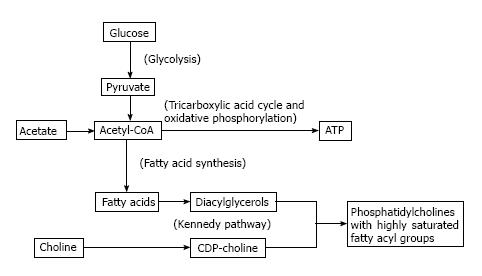Copyright
©The Author(s) 2016.
World J Radiol. Nov 28, 2016; 8(11): 851-856
Published online Nov 28, 2016. doi: 10.4329/wjr.v8.i11.851
Published online Nov 28, 2016. doi: 10.4329/wjr.v8.i11.851
Figure 1 The interplay between glucose, acetate, and choline metabolism.
By providing substrate for de-novo fatty acid synthesis, acetate metabolism may feed into phosphatidylcholine synthesis, explaining why tumors showing high uptake of 11C-acetate may also show increased uptake of radiolabeled choline on PET. Because acetyl-CoA produced from acetate may also serve as a substrate for the citric acid cycle and other pathways, it is possible that, for some cancers, 11C-acetate uptake may not always provide a consistent readout of tumor lipogenesis. The Kennedy pathway is an ATP-dependent pathway that may rely to varying degrees on glycolysis as a source of ATP. ATP: Adenosine triphosphate.
- Citation: Kwee SA, Lim J. Metabolic positron emission tomography imaging of cancer: Pairing lipid metabolism with glycolysis. World J Radiol 2016; 8(11): 851-856
- URL: https://www.wjgnet.com/1949-8470/full/v8/i11/851.htm
- DOI: https://dx.doi.org/10.4329/wjr.v8.i11.851









